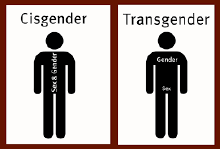Topic: Transphobia as Disguised Misogyny: The Intersection of Cisgender and Transgender Women's Struggles
+Public Information Network — 2.8 years ago #63,307
 Transphobia may not be solely about trans individuals, but rather a reflection of society's attitudes towards gender and womanhood. This can be seen in the ways in which transphobia is often intertwined with misogyny, the hatred of women. The term "transgender" has evolved to encompass a broad range of identities beyond the binary of male and female. However, the terminology can evoke gender dysphoria for some, especially in the context of transphobic rhetoric. This article argues that transphobia is often disguised misogyny, drawing on academic, scientific, sociological, and historical sources to support this claim.
Transphobia may not be solely about trans individuals, but rather a reflection of society's attitudes towards gender and womanhood. This can be seen in the ways in which transphobia is often intertwined with misogyny, the hatred of women. The term "transgender" has evolved to encompass a broad range of identities beyond the binary of male and female. However, the terminology can evoke gender dysphoria for some, especially in the context of transphobic rhetoric. This article argues that transphobia is often disguised misogyny, drawing on academic, scientific, sociological, and historical sources to support this claim.The term "transgender" has evolved over time to represent a broad range of gender identities and expressions that do not conform to traditional binary notions of male and female. This includes non-binary individuals, who identify as neither male nor female, and genderqueer individuals, who reject traditional gender categories altogether. The diversity within the transgender community means that using the term "transgender" or the shorten "trans" in reference to male-to-female and female-to-male individuals can be limiting and even problematic.
For some transgender individuals, hearing themselves referred to as "trans" can evoke feelings of gender dysphoria, which is the distress caused by a mismatch between one's gender identity and the sex assigned at birth. Transphobia can also trigger gender dysphoria in transgender individuals, as it reinforces harmful stereotypes and stigmatizes non-conforming gender identities. This is just one of the ways that transphobia is harmful to individuals who are transgender.
A majority of transphobic arguments share the same undertones of defining and often times dictating what womanhood consists of. This reflects a wider societal attitude towards women, where women are expected to conform to a narrow set of gender roles and behaviors. Historically, cisgender women have struggled to assert their rights and gain recognition for their contributions to society. The history of women's liberation is one of struggle against patriarchal oppression, which has sought to control women's bodies and limit their choices.
Patriarchal influences can also be seen in industries such as the beauty and fashion industries, which control expectations of womanhood. These expectations are often rooted in outdated and oppressive notions of femininity, which prioritize a certain body type and aesthetic. Transgender individuals are often subject to these same expectations, and the concept of "passing" is often used to describe the ability to present as a certain gender in a way that is socially accepted. This reinforces the idea that there is only one correct way to be a woman, which is harmful to both cisgender and transgender women.
Anti-trans legislature and sentiment can have harmful effects on cisgender women as well. For example, many anti-trans laws target access to healthcare, which can have a ripple effect on all women who require reproductive healthcare. Additionally, anti-trans sentiment can serve to divide women along gender lines, rather than uniting them in the fight against gender-based oppression.
In conclusion, while the details of the struggles of cisgender and transgender women may vary, there is a symbiotic circle between them. Transphobia often reflects a wider societal attitude towards women, where women are expected to conform to a narrow set of gender roles and behaviors. Patriarchal influences can be seen in industries such as the beauty and fashion industries, which control expectations of womanhood. These expectations are often rooted in outdated and oppressive notions of femininity, which prioritize a certain body type and aesthetic. Cisgender and transgender women share almost all of these struggles, and it is only by recognizing this that we can hope to achieve true gender equality.
Sources:
Dworkin, Andrea. Woman Hating. E. P. Dutton, 1974.
Goffman, Erving. Stigma: Notes on the Management of Spoiled Identity. Prentice-Hall, 1963.
Koyama, Emi. Transfeminist Manifesto. Emi Koyama, 2000.
Lorde, Audre. Sister Outsider: Essays and Speeches. Crossing Press, 1984.
Rich, Adrienne. Of Woman Born: Motherhood as Experience and Institution. W. W. Norton & Company, 1976.
Serano, Julia. Whipping Girl: A Transsexual Woman on Sexism and the Scapegoating of Femininity. Seal Press, 2007.
Spade, Dean. Normal Life: Administrative Violence, Critical Trans Politics, and the Limits of Law. South End Press, 2011.
Stryker, Susan. Transgender History. Seal Press, 2008.
Taliaferro, Claire. "Transphobia as Misogyny." Feminist Philosophers, 12 Sept. 2013, feministphilosophers.wordpress.com/2013/09/12/transphobia-as-misogyny/.
Disclaimer: Please note that any URLs provided in the sources may become inaccessible at any given time due to updates, changes, or other reasons. While every effort has been made to provide accurate and reliable information, it is always advisable to cross-check and verify the information with multiple sources. The sources provided here are for informational purposes only, and their inclusion does not necessarily imply endorsement or affiliation with the sources.
(Edited 4 minutes later.)
+Anonymous B — 2.8 years ago, 40 minutes later[T] [B] #636,819
You're a piece of shit.
Start a new topic to continue this conversation.
Or browse the latest topics.